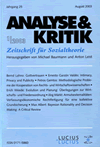Suchergebnisse
"Tilo Wesche"
Titel: The Concept of Property in Rawls's Property-Owning Democracy
Autor: Tilo Wesche
Seite: 99-111
Abstract: Understanding the relationship of democracy and property ownership is one of the most important tasks for contemporary political philosophy. In his concept of property-owning democracy John Rawls explores the thesis that property in productive means has an indirect effect on the formation of true or false beliefs and that unequal ownership of productive capital leads to distorted and deceived convictions. The basic aspect of Rawls’s conception can be captured by the claim that for securing the fair value of the political liberties a widespread dispersal of property in productive resources is required that minimizes the formation of delusions and therefore improves the conditions of deliberative democracy.
Titel: Comment on Tilo Wesche
Autor: Jan Narveson
Seite: 113-119
On Property-Owning Democracy
Abstract: The gist of Welsche’s argument seems to be to pick up on an idea he attributes to Rawls, that in a true property-owning democracy, productive wealth would be distributed more broadly ’ex ante’ rather than, as now, ’ex post’, the point of demarcation being the use of capital to generate wealth and income. As against this, I argue that ex ante distribution of capital is impossible, because business activity creates wealth, and thus we don’t know what there is to distribute ex ante. Moreover, the prospect of greater wealth for the producers ex post is what especially motivates them to produce, and without production we are poor. It is also noted that Rawls’s ’difference principle’ does not in fact have the egalitarian implications he supposes, nor really any distributive implications, despite Rawls’s intentions.

Property-Owning Democracy
2013 (35) Heft 1
Guest-Editors: Francis Cheneval / Christoph Laszlo
Editorial
In recent years, ’property-owning democracy’ (POD), defined by widespread ownership of productive assets, has become one of the key-factors in the assessment of the institutional design implied in John Rawls’s theory of justice. The wider implications of this inquiry also engage scholars who do not subscribe to Rawls’s conception of justice but are broadly interested in normative questions of political economy and the basic structure of a just polity. In the course of this debate, the in...